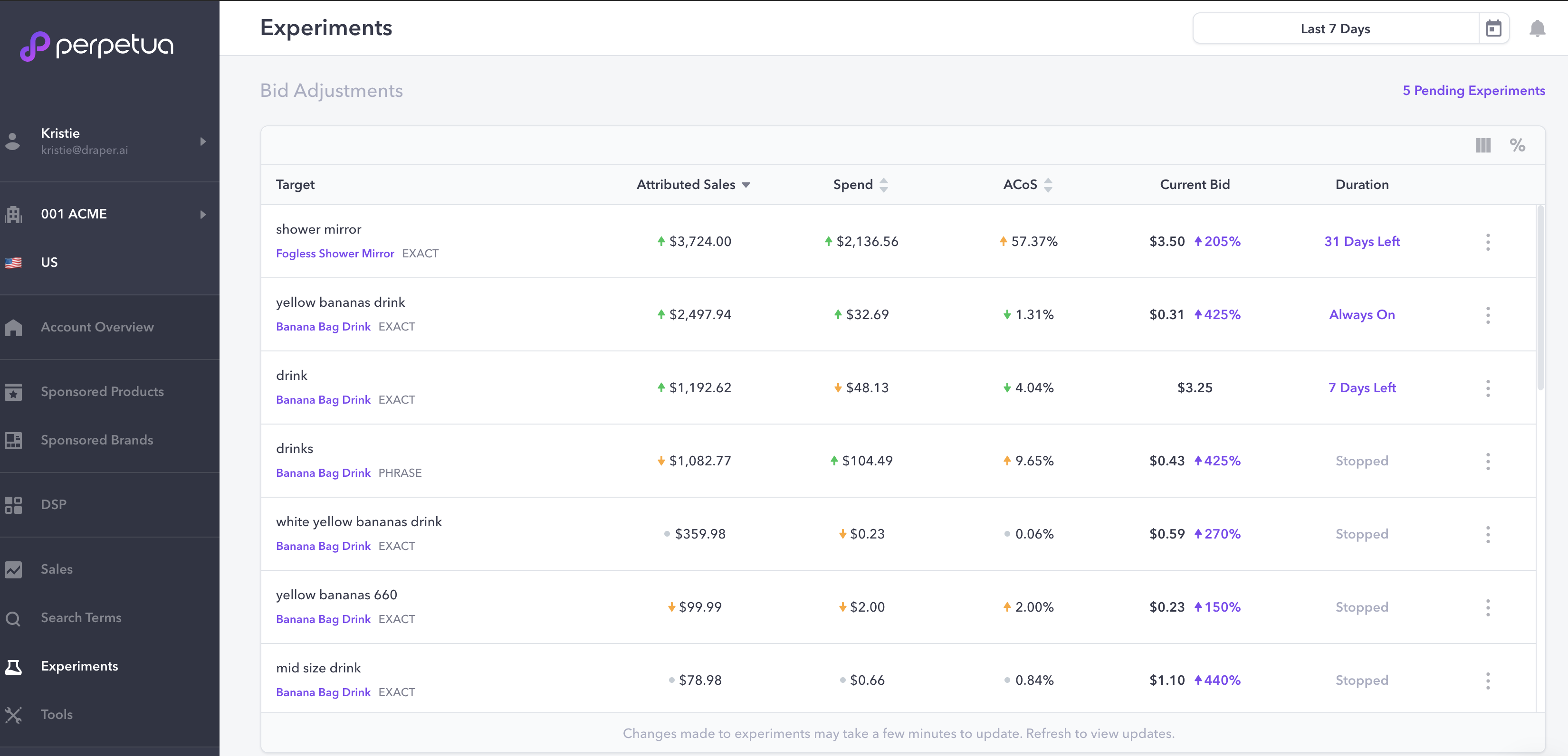
Introducing Keyword Boost: Your Shortcut to Climbing Organic Rank
Adam Epstein, January 15, 2020
There are typically a handful of keywords that are absolutely critical for your business, and performance and relevance on these keywords have a direct correlation to winning on Amazon.
It's widely known that Amazon also places a high value on the traffic and conversions from the top three placements on the search results page, also known as Top of Search, as a signal for organic rank.
Historically, advertisers have needed to manually calculate their bids on these keywords - and each individual placement within a given keyword - to effectively allocate spend to what is driving results for their business. Doing this manually on one keyword and one product is challenging; scale this up to many keywords across multiple products, and it becomes almost impossible.
This manual process leads to excess inefficient spend across placements, and worse; in the absence of a sound strategy with meticulously employed tactics, you may lose your organic rank on keywords that are vital to your business.
With the introduction of Keyword Boost and Bid Adjustments, we've made it possible for our customers to experiment together with our ad engine to dominate top-of-search, own your flagship category keywords and climb organic rank.
In this article, you’ll learn:
What Keyword Boost is and why you should use it
What Bid Adjustments are and when to use them
Tips on how you can use these features to improve the performance of your business
Introducing Keyword Boost.
Keyword Boost - as the word implies - was built in an effort to dominate strategic keywords that help customers win.
Given that placements can only be manipulated at the keyword level, when you "boost a keyword" in Perpetua, that keyword will be put into a single keyword campaign with a top of search multiplier. Our Top of Search Multiplier is applied in percentage increments (Auto, 50%, 100%, 150% and 200%) so you can juice top of search as aggressively as you see fit.
Additionally, a specified ACOS target and budget are applied to the dedicated keyword campaign to provide customers with added controls on these vital keywords.
Put simply: there is no better way to climb organic rank on flagship category keywords.
As a caution, this can be an expensive endeavour. But incremental profits come from climbing organic rank on category keywords. While advertising metrics may be a little disconcerting, the goal here is not efficiency. The goal is to climb organic rank and boost organic sales (i.e. profits), and by using Keyword Boost you need to be comfortable with high spend and a less efficient ACOS.
For some brands, owning top of search can be a brand-building exercise as well. As an example, if you are a cereal company like Cheerios, it may be part of your brand strategy to appear in the first or second placement on the search page anytime someone searches "cereal". This may come at a cost, but you're doing this to invest in the prime real estate on the digital shelf of a search term with significant volume and impressions. In this instance, share of voice on that keyword (also coming to Perpetua soon) is a relevant metric to measure the effectiveness of this strategy.
Bid Adjustments
In addition to Keyword Boost, we're also introducing a powerful feature called Bid Adjustments.
Our aim is for our ad engine to bid as optimally as possible on the most relevant keywords. However, we know there are shortcomings that come with a lack of data and context, and we want to give our customers advanced controls to manipulate keywords by increasing or decreasing bid aggressiveness as they see fit.
There are two types of Bid Adjustments that can be made:
AI-Powered (Multiplier) - This is a multiplier on our ad engines bid on a specific keyword. For example, you can take a $1 bid and increase it by a 200% multiplier, which will raise the bid to $2.00. This bid will change dynamically with our algorithms (expect to see continued daily bid price changes), however customer directed multiplier will remain. We recommend using this version of this feature.
Fixed Bid - Allows our customers to specify a static bid. For example, if you change the bid from $1 to $2, it’ll remain the same for the set duration that you've chosen. Given that this is static, we only recommend our customers employ the fixed bid if they have incredibly strong convictions of keywords and bid price.
If a customer makes a Bid Adjustment, Perpetua will honor the target ACOS within that goal. Meaning, bids will adjust on the other keywords and ASINs within the goal to correspond with the ACOS changes of the adjusted keyword. The aggregate ACOS remains aligned with the overall target.
Note: As of now, Bid Adjustments support any targeting type - so exact phrase, broad keywords, auto campaigns, and ASINs - but does not support category keywords within a PAT campaign.
When and why would you use Bid Adjustments?
We recommend customers employ this feature if there are clearly relevant keywords that are being underbid on by our ad engine. Conversely, if our ad engine is bidding too aggressively on poor performing keywords and you want to limit what may be perceived as less efficient spend on poor performing keywords.
Additionally, we know that our product could be "smarter" on product launches. In many instances, our ad engine isn't as fast as our customers would be in recognizing and executing on the most relevant keywords for a new product, without any advertising history. In those instances, we strongly recommend the use of this feature to get the best results as fast as possible.
Experiments
You might be wondering, "shouldn't Perpetua be doing this without my input?" The answer is "kind of".
We've built a very powerful but easy to use tool to allow our customers to employ the best possible strategy on Amazon. However, each customer's strategy is different.
In our experience, driving results on Amazon requires a mix of human direction on strategy with software to execute the tactics of that strategy. These features are a big step towards Perpetua marrying the ideal combination of human and machine.
To that end, we recognize that the use of these features may lead to both dramatically positive and negative performance. However, we wanted to create a dedicated place for our customers to monitor the effectiveness of these newly employed strategies. We created a dedicated tab in Perpetua called "Experiments".

Any time a Bid Adjustment or Keyword Boost is executed, customers can access this tab to gauge the performance of the Experiment. And if it's incredibly effective, can extend its duration - or if incredibly detrimental, stop it immediately.
This is arguably one of the largest evolutions of our product over the past year. It is the culmination of all the feedback that we've received from our savviest customers. We hope that our customers appreciate that this furthers our mission: giving superpowers to anyone that sells online - and we are super excited to see have our customers adopt and execute Keyword Boost and Bid Adjustments (albeit judiciously).
If you have any questions or want to learn more about Keyword Boost and Bid Adjustments, send us an email at hello@perpetua.io.
To get started or learn more about how Perpetua can help you scale your Amazon Advertising business, contact us at hello@perpetua.io
Top Stories